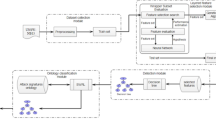Abstract
In this paper, a new approach is suggested for designing and developing an intrusion detection application where the domain expertise is used for generating it more easily. This approach uses ontologies as a way of grasping the knowledge of a domain, expressing the intrusion detection system much more in terms of the end users domain, generating the intrusion detection more easily and performing intelligent reasoning. Experimental results show that our anomaly detection techniques are very promising and are successful in automatically detecting intrusions at very low false alarm rate compared with several important traditional classification techniques.
Similar content being viewed by others
References
DAMLJessKB (October 2002), Available at, http://edge.cs.drexel.edu/assemblies/software/damljesskb/
Lee, W.S., Stolfo, J., Mok, K.W.: Data Mining in Work Flow Environments: Experiences in Intrusion Detection. In: Proceedings of the 1999 Conference on Knowledge Discovery and Data mining (KDD 1999), pp. 253–262 (1999)
Reddyl, Y.B., Guha, R.: Intrusion Detection using Data Mining Techniques. In: Artificial Intelligence and Applications (AIA 2004), pp. 232–241 (2004)
Undercoffer, J., Pinkston, J., Joshi, A., Finin, T.A.: Target-Centric Ontology for Intrusion Detection. In: IJCAI Workshop on Ontologies and Distributed Systems, IJCAI 2003 (August 2003)
Kumar, S., Spafford, E.H.: A Software Architecture to Support Misuse Intrusion Detection. In: Proceedings of the 18th National Information Security Conference, pp. 194–204 (1995)
Author information
Authors and Affiliations
Editor information
Editors and Affiliations
Rights and permissions
Copyright information
© 2006 Springer-Verlag Berlin Heidelberg
About this paper
Cite this paper
Hung, SS., Liu, D.SM. (2006). An Ontology-Based Network Intrusion Detection System: A User-Oriented Approach. In: Mehrotra, S., Zeng, D.D., Chen, H., Thuraisingham, B., Wang, FY. (eds) Intelligence and Security Informatics. ISI 2006. Lecture Notes in Computer Science, vol 3975. Springer, Berlin, Heidelberg. https://doi.org/10.1007/11760146_105
Download citation
DOI: https://doi.org/10.1007/11760146_105
Publisher Name: Springer, Berlin, Heidelberg
Print ISBN: 978-3-540-34478-0
Online ISBN: 978-3-540-34479-7
eBook Packages: Computer ScienceComputer Science (R0)




